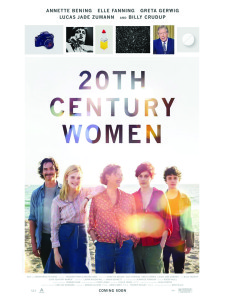
“20th Century Women” is a semi-autobiographical comedy-drama directed by Mike Mills about a single mother, Dorothea (Annette Bening), struggling to raise her teenage son Jamie (Lucas Jade Zumann) during the summer of 1979. With assistance from two young women — Jamie’s childhood friend Julie (Elle Fanning) and boarder Abbie (Greta Gerwig) — Dorothea seeks to shape her son into a man in a turbulent, confusing era.
Whereas Mills’ previous film, “Beginners” was inspired by his relationship with his father later in life, “20th Century Women” takes inspiration from his adolescent experience with his mother. However, what I think separates this film from many others that explore mother-son dynamics is the way in which its ensemble cast all learn from each other and develop as characters. Its narrative structure is loose, composed like a series of vignettes that serve to both flesh out its characters and see to it that Jamie is given the care his mother believes he needs.
One of the most impressive qualities of “20th Century Women” is its incredibly likeable characters, each with their own distinct personalities and depth. They each initially show hints of turning into archetypical characters but quickly prove to be anything but. Bening’s role as Dorothea was an absolute pleasure to see, providing almost too much warmth and vibrancy to the film. Her earnest attempts at understanding the world her son inhabits, coupled with her free-spirited charm were as insightful as they were hilarious. Zumann also gives a solid performance in his role as an angsty teenager muddling through his teenage years in a technicolor blur, learning not only about himself and his mother but the great big crazy world.
The supporting cast — if they can even be called that considering they were as vital as the two mains — were just as excellent. Gerwig gives her best performance since “Frances Ha,” showcasing not only the charisma she is known for, but also her ability to portray a resolute, dynamic character with compassion and a strong sense of agency. Fanning, too, does a great job portraying Jamie’s childhood friend Julie, often acting as pretentious as any teenager who thinks they have life figured out. Stern and steadfast in her beliefs, Julie bears a unique perspective on the world around her, giving her an interesting disposition that will surprise audiences with each scene. Last but not least is William (Billy Crudup), the older boarder with equal affinity for engines and pottery. Crudup is no different from any of the other cast with regard to his portrayal of his character: A surprising amount of depth exceeded my expectations of him as the dumb, stereotypical mechanic type. Actors are only as good as the script and direction they are given and Mills’ handled them with finesse.
In Linklater fashion, Mills takes the audience on a road trip of sorts, with each of the scenes capturing a slice of life for these folks both young and old. Jamie’s youthful energy finds him getting drunk and going to hardcore shows in the heart of LA only to be beat up by one of his peers for questioning the other’s sexual prowess. The reason for such inquisition? Abbie instructed the teen to read the seminal feminist book, “Our Bodies, Ourselves,” which teaches the confused teen about clitoral stimulation. Watching Jamie both learn and teach the women around him is equal parts tender and comical. Mills carefully places the bunch in situations that could easily be mishandled in other generic indie titles that shoehorn a sense of importance on their dull cast.
At times meandering, Mills’ script takes great pleasure in exploring the simple pleasures in these characters’ lives. Dorothea and William share a joyously humorous scene in which they try, really hard, to listen to Black Flag’s “Nervous Breakdown” and accept that they are more keen on the Talking Heads’ “The Big Country.” Scenes of deceivingly little importance relative to the main plot turn out to be wonderful snapshots of the moments these characters spend together, weaved seamlessly one into the other.
Constant unexpected turns amount to an experience that is more than the sum of its parts: “20th Century Women” is as much a celebration of life as it is a celebration of the women from that era.
Rating: 9/10







